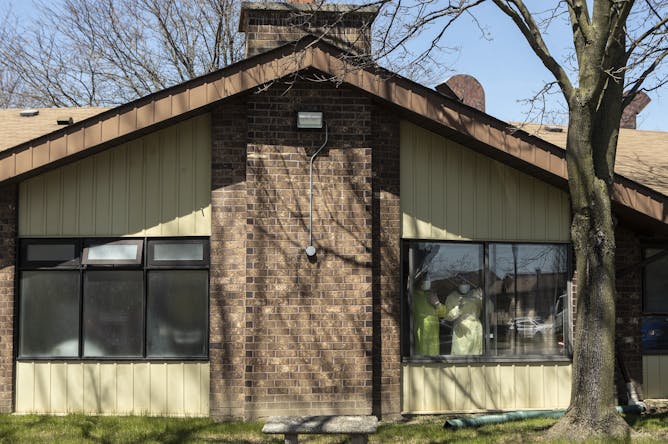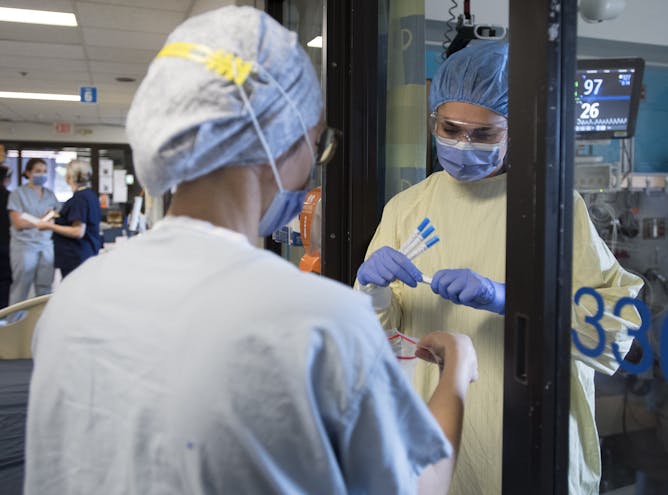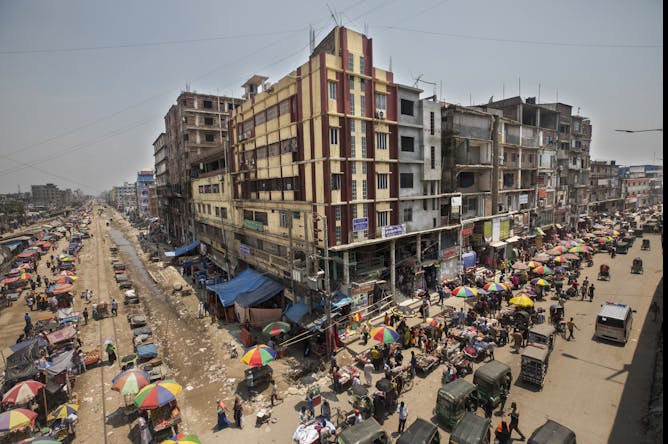|
|
|
Serious systemic issues remain in long-term living facilities
|
|
One of the most disturbing consequences of the coronavirus pandemic is that more than 80 per cent of Canadians who have died from COVID-19 were residents at long-term care facilities. Today in The Conversation Canada, Gillian Parekh of York University and Kathryn Underwood of Ryerson University note that even before the pandemic, long-term care facilities had disturbing incidences of abuse, neglect and even murder. “Yet the conditions that allow such atrocities to occur continue,” they write. And if anything is going to change in our post-pandemic world, “people with disabilities and those who have experienced life in long-term care need to be at the forefront, leading and advising on systemic change.”
Also today:
Regards,
|
Vicky Mochama
Culture, Society, Critical Race Editor
|

|
|
Coronavirus News
|

Staff members stand at a window as they watch a parade of well-wishers driving by Orchard Villa Care home, in Pickering, Ont., on April 25, 2020.
THE CANADIAN PRESS/Chris Young
Gillian Parekh, York University, Canada; Kathryn Underwood, Ryerson University
As governments start to return to a new normal, people with disabilities in care facilities are still in serious danger of being left behind during the coronavirus pandemic.
|

Nurses collect samples from a patient in the COVID-19 intensive care unit at St. Paul’s hospital in Vancouver on April 21, 2020.
THE CANADIAN PRESS/Jonathan Hayward
Margaret McKinnon, McMaster University; Ruth Lanius, Western University
Moral injury happens when someone is faced with a choice that violates deep moral beliefs. Health-care workers treating COVID-19 might be forced to choose between 'wrong' and 'wronger.'
|

On Parliament Hill and at provincial legislatures across the country, politicians must resist pressure from industry and corporate lobbyists amid the COVID-19 pandemic.
THE CANADIAN PRESS/Sean Kilpatrick
Mark Winfield, York University, Canada
The COVID-19 crisis has raised major questions about the viability of the economic, business and employment models that corporate and industry lobbyists are arguing for a return to.
|

Students in an after-school drama club in Athens rehearse their performance about the refugee crisis, March 2017.
(Kathleen Gallagher)
Kathleen Gallagher, University of Toronto
Despite hardships, youth are rallying to build a new vision for the planet. The rest of us should join them.
|

A market area in Dhaka, the Bangladeshi capital, crowded with people despite the coronavirus pandemic, May 12, 2020.
hmed Salahuddin/NurPhoto via Getty Images
Robert Muggah, Pontifical Catholic University of Rio de Janeiro (PUC-Rio); Richard Florida, University of Toronto
COVID-19 is spreading fast through not only the world's richest cities but also its poorest, ravaging slum areas where risk factors like overcrowding and poverty accelerate disease transmission.
|
Non-Coronavirus News
|

Chipmunks have a superpower: hibernation.
(Shutterstock)
Andrea Wishart, University of Saskatchewan
Squirrels and chipmunks are distant cousins who have grown a little more apart from each other over millions of years.
|

In the movie based on William Paul Young’s ‘The Shack,’ Mack (Sam Worthington), second from the left, meets the Trinity. From left to right: Jesus, the Son (Avraham Aviv Alush), Papa, God the Father (Octavia Spencer) and Sarayu, the Holy Spirit (Sumire Matsubara).
(Summit Entertainment, Lionsgate)
Christopher Douglas, University of Victoria
The problems of suffering and evil emerging in the coronavirus pandemic occupy popular evangelical fiction. In 'The Shack,' proliferating divine beings harken to a long-standing solution.
|

A mathematical discovery made in prison is about the pursuit of knowledge and redemption.
(Shutterstock)
Marta Cerruti, McGill University
Christopher Havens came upon his love of math while in solitary confinement. A decade later, he published a paper on number theory in a top mathematics journal.
|
La Conversation Canada
|

Tour de télécommunication avec antenne de réseau cellulaire 5G. Avec la pandémie, les fausses nouvelles concernant la 5G se sont propagées à une vitesse fulgurante sur les réseaux sociaux.
shutterstock
Tchéhouali Destiny, Université du Québec à Montréal (UQAM)
Les fausses nouvelles concernant la 5G se sont propagées à une vitesse fulgurante sur les réseaux sociaux, renforçant les craintes des citoyens qui suspectaient déjà ses effets sur la santé.
|
| |
| |
| |
| |
| |
| |
|
|
|
|
|
|
|